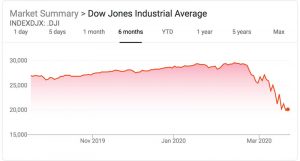The coronavirus economic impact on consulting, like its impact on any sector of the economy, is uncertain. But, it’s difficult to make an argument for it having anything but a negative influence on consulting. The question, really, is how much of an economic downturn will this result in? And will we see a global recession in 2020?
Overall, consultants do well in both up and down economies. Why? When times are good, companies have larger budgets and pursue growth opportunities. When times are bad, companies need help tightening their belts in a strategic and targeted way. Still, in the short term, the coronavirus will no doubt negatively impact consulting.
In this article, we’ll explore the magnitude of the coronavirus economic impact and what this means for the consulting industry.

The Coronavirus Is The Worst Natural Disaster To Ever Hit The US
It’s important to note the magnitude of the disaster that we are facing. The U.S. has indeed been through several events that will perhaps prove to be more impactful on its citizens and on the economy than COVID-19. We survived the Civil War, two World Wars, and 9/11. But these were not natural disasters (and the jury is still out on whether they will or will not be more impactful than Coronavirus).
There really is no denying that the Coronavirus is the worst natural disaster to ever hit the U.S. We have had hurricanes, fires, and floods, and droughts absolutely ravage parts of the U.S., killing many people and severely impacting the economy in the process. But we have never faced a natural disaster that so completely impacts every single citizen.
We are being asked, encouraged, and in some cases forced to stay inside, stay socially distant, and refrain from working. The coronavirus impact on supply chain functioning and consumers’ ability or willingness to spend money is likely to be dramatic. Many economists are forecasting a recession in 2020 as a result. We’ll review this process in the next section of this article.
Coronavirus Economic Impact Unpacked
The coronavirus is already causing an economic downturn, some calling it the catalyst of a probable recession in 2020. While the long-term coronavirus impact on the economy is unclear, there are already good  reasons to consider it a shock worthy of comparison to the stock market crash of 1929 - a key factor in driving the U.S. toward the Great Depression - the dotcom bubble of 1999, and the Great Recession of 2009. To put things in perspective, using the stock market as a proxy for economic impact, the DJIA dropped ~90% (!) during the Great Depression. It dropped ~50% during the Great Recession. As of publishing date, it has already dropped 33%. And that 33% drop has occurred extremely quickly.
reasons to consider it a shock worthy of comparison to the stock market crash of 1929 - a key factor in driving the U.S. toward the Great Depression - the dotcom bubble of 1999, and the Great Recession of 2009. To put things in perspective, using the stock market as a proxy for economic impact, the DJIA dropped ~90% (!) during the Great Depression. It dropped ~50% during the Great Recession. As of publishing date, it has already dropped 33%. And that 33% drop has occurred extremely quickly.
As you may know, the value of a stock should be the discounted profits that the business will generate next year and every other year after that into perpetuity. So, in theory, such dramatic drops in the value of stocks are difficult to explain. But the stock market is not fully rational. The level of uncertainty around how bad the situation might get is extremely high.
Coronavirus Impact On Supply Chain & Ripple Effects
There is both a substantial supply-side and demand-side shock occurring here. Workers, because of social distancing requirements, can’t operate distribution centers and factories, severely disrupting supply chains. And unless the government steps in or businesses are extremely generous, eventually these workers will stop getting paid, depending on how long the social distancing process lasts.
At the same time, again because of social distancing, consumers are unable to spend money on goods and services outside of doing so online. People who are unable to go to work won’t have as much, or any, discretionary income to spend anyway. This will only make the economic downturn worse.
Some sectors of the economy, such as those that involve online engagement and purchases, may do OK. But the travel industry, recreation, automotive, and a variety of service-based sectors will suffer. These industries are already faced with the stark reality of a 2020 recession. Bars, restaurants, gyms, movie theaters, dry cleaners, nail salons, and more will struggle, and many will be forced to close. All of this will hit those lower on the socioeconomic ladder hardest and first. But eventually, this will likely begin reducing employment levels in the ranks of white-collar professionals too.
What Does This Mean For Consulting?
You should not be surprised if a recession occurs in 2020 as a result of the Coronavirus. There will be some businesses with interesting market positions who may seek help navigating this unprecedented environment and could turn to consultants. A business that needs creative ideas to avoid going bankrupt, such as a business in a travel industry, may seek consulting help. Alternatively, a relatively well positioned business, perhaps one that makes packaged foods it sells to grocery stores (which is a somewhat recession proof and even Coronavirus-proof activity), may want help designing an M&A strategy while valuations of potential acquisition targets are low. The economic downturn could prove to provide some interesting consulting opportunities.
But many will seek to put most optional projects with external partners on hold until  they have certainty on how this situation plays out. This won’t bode well for the consulting industry. We know a Director at a small growth strategy consulting firm and of his three major clients, one has put its consulting on hold. Another seems close to doing so. That leaves the firm with one major client, and they’ve had to put some planned hiring on hold. Another contact at Bain mentioned that more than half of his projects are now on pause. These are real effects of the economic downturn that is already felt, let alone any recession in 2020.
they have certainty on how this situation plays out. This won’t bode well for the consulting industry. We know a Director at a small growth strategy consulting firm and of his three major clients, one has put its consulting on hold. Another seems close to doing so. That leaves the firm with one major client, and they’ve had to put some planned hiring on hold. Another contact at Bain mentioned that more than half of his projects are now on pause. These are real effects of the economic downturn that is already felt, let alone any recession in 2020.
Leverage The Time For Business School?
If you work for a consulting firm, and you are in a position to consider, for example, going to business school, this may not be the worst time to pursue that. You may be on the beach more often with more time to study for the GMAT and apply to school. The 1-2 years you spend in school may turn out to be a challenging time in consulting, with layoffs or role stagnation. On the other hand, it may be a good time to hold on to a job where you are making good money and invest in the stock market while prices are low.
Consulting Positions Will Be Extremely Competitive
If you are considering a career in consulting, now may be a challenging and more competitive time to break in. However, if you are passionate about the industry - as it makes sense to be given the learning and professional growth consulting roles provide - be sure to invest in interview prep and resume edits, because the number of applicants per open role is likely to increase.
[globalcta id="CTA-Resume-Question-v1"]
Conclusion
The coronavirus is a big deal for everyone, including current and aspiring consultants. The impact on the economy is likely to be large. But that doesn’t mean you necessarily should or should not pursue a career in consulting as a result. However, it is important to recognize the severity of the situation and consider how best to prepare and develop backup plans for your career. We are here to help however we can. Reach out to us with your specific questions at team@managementconsulted.com, and stay up-to-date on industry changes via our email newsletter.